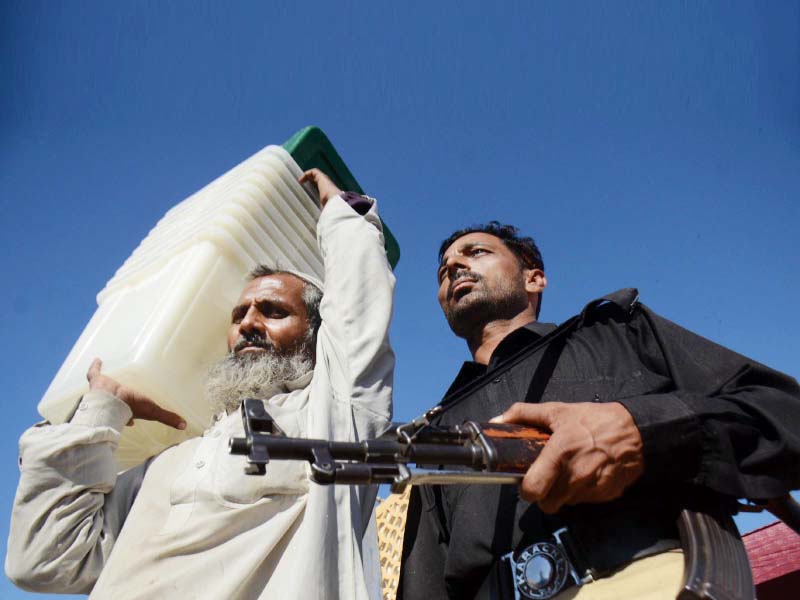
The third and final phase of Sindh’s local government elections is set to be held in Karachi today (Saturday), bringing to conclusion an exercise that is being conducted in the province after a gap of almost 10 years.
In terms of votes, the electoral exercise will be the biggest to take place in the country – as many as 7,083,066 registered voters will elect members of 244 union councils of Karachi out of over 5,000 candidates. Of the over seven million voters, 4,065,791 are men and 3,017,275 are women.
How to cast your vote on Saturday
Elections for three union councils have been postponed following the deaths of some candidates and some 46 candidates have been elected unopposed for some of the slots.
The parties staking their claims in Karachi are the Muttahida Qaumi Movement (MQM), the Pakistan Peoples Party (PPP) and an alliance between Pakistan Tehreek-e-Insaf (PTI) and Jamaat-e-Islami (JI).
The majority of candidates vying to be chairpersons, vice-chairpersons and councillors of Karachi’s union councils are independent. MQM accounts for only 953 candidates, PPP just 763 and PTI and JI 618 and 580 respectively.
Despite that, the actual competition is expected between the MQM and the PTI-JI alliance. Of the two, MQM appears more likely to emerge victorious again as it has twice in the past.
Still, analysts say independents might yet win a major chunk of the slots and some seats can fall to PPP, Pakistan Muslim League-Nawaz (PML-N) and the Awami National Party (ANP).
MQM has fielded its candidates in only 70% of Karachi, focusing mainly on areas dominated by Urdu-speaking residents. These areas include Federal B Area, Liaquatabad, Jamshed Quarters, Shah Faisal Colony, Korangi, Nazimabad, North Nazimabad, New Karachi, North Karachi, Gulshan-e-Iqbal and Surjani Town.
Karachi LG polls: Rangers can take action inside polling stations
PPP, on the other hand, has confined its campaign to pockets dominated by Sindhi and Baloch residents in Malir and South and West districts.
In Pakhtun-dominated areas, the majority of votes may go in the PTI-JI alliance’s way and even some former ANP workers and leaders have started extending support to the two parties.
The alliance has emerged as an alternative to MQM in many areas as well, especially in District East, Central, West and South, where PTI-JI candidates have high hopes of securing the majority.
Interestingly, both the PTI and JI have made the alliance only in those areas where they have a weaker position compared to MQM and other groups. The candidates of the two parties are contesting against each other in some other areas, such as Lyari.
The PPP may, for the first time, face difficulties in Lyari, which has traditionally been the party’s bastion in Karachi. JI especially seems to be re-emerging as a force in Lyari, particularly in the Moosa Lane and Nawa Lane areas of the neighbourhood from where the late party leader and former Karachi mayor Abdul Sattar Afghani always won the polls. The PPP has also fielded candidates in only eight of Lyari’s 15 union councils due to internal rifts within the party.
As a whole, however, the vote in Lyari will be divided and PPP will have a chance to reclaim parts of its traditional stronghold.
“Only our [PPP’s] own people who are contesting independently can give us a tough time,” said one PPP senior leader who hails from Lyari. “Other parties have no hope in Lyari. After the election, independent candidates will join us again,” he hoped.
Who will the most literate district in the country vote for?
Along with Lyari, Malir too used to be a traditional citadel for PPP. The situation in Malir has now changed, however, and the area is now influenced by the MQM and its breakaway Haqiqi faction.
The PPP’s main focus in Karachi is winning the district council chairman’s slot for the rural areas of Malir and District West. The party has put most of its resources and energy in securing the 38 union councils of these sub-urban areas, as its hopes of winning slots in the Karachi Metropolitan Corporation or in any district municipal corporation have diminished.
However, winning that slot won’t be easy for PPP as over a dozen parties and independent groups have made an alliance against it.
Security measures and challenges
A total of 4,144 polling stations have been set up for today’s exercise in Karachi but hardly seven per cent of them are safe. The Election Commission of Pakistan has declared 1,791 polling stations ‘most sensitive’ and another 2,116 as ‘sensitive’.
To provide security, the Sindh government will deploy a force of more than 35,000 policemen and 7,400 Rangers. The Rangers personnel have been given magisterial powers and will be deputed in most sensitive areas.
JI candidates using convict Mumtaz Qadri to garner votes
The ECP has also asked the army to patrol in sensitive areas and provide backup to the police and paramilitary troops. Some 20 army companies, each of which comprises 200 to 250 personnel, will be available as a quick reaction force in case of emergency, according to ISPR. They will reach polling station within minutes if polling staff request their support.
Published in The Express Tribune, December 5th, 2015.

1732790824-0/BeFunky-collage-(3)1732790824-0-165x106.webp)
1719389141-0/BeFunky-collage-(14)1719389141-0-165x106.webp)
1719299420-0/Untitled-design-(21)1719299420-0-165x106.webp)

1732787901-0/BeFunk_§_]__-(67)1732787901-0.jpg)

1732789727-0/BeFunk_§_]__-(68)1732789727-0.jpg)


1732783305-0/Untitled-design-(6)1732783305-0-270x192.webp)






COMMENTS
Comments are moderated and generally will be posted if they are on-topic and not abusive.
For more information, please see our Comments FAQ